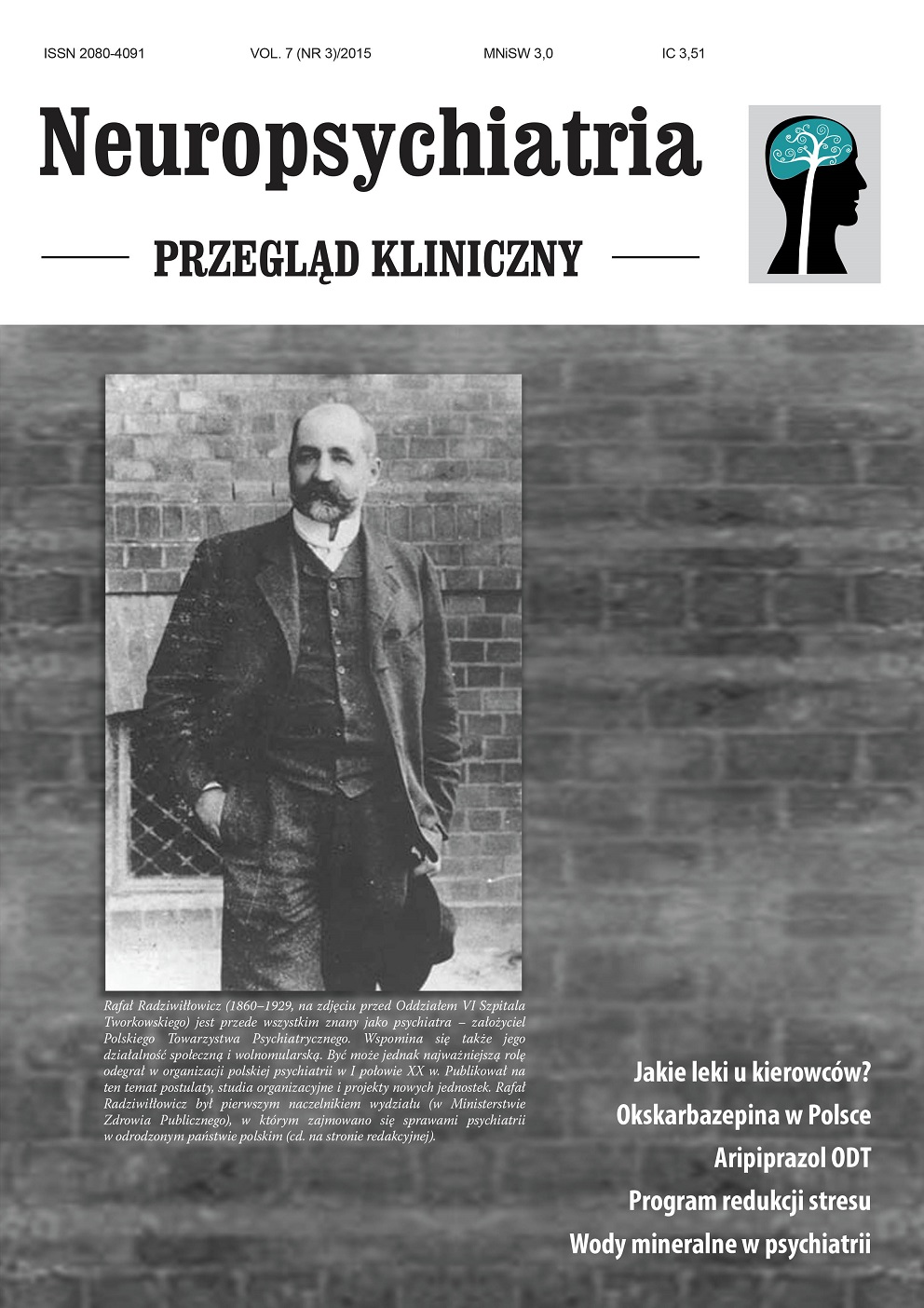Aripiprazol ODT: kolejny lek psychotropowy w postaci tabletek rozpuszczalnych w ustach Artykuł przeglądowy
##plugins.themes.bootstrap3.article.main##
Abstrakt
Aripiprazol, częściowy agonista dopaminy, jest lekiem o działaniu przeciwpsychotycznym, stabilizującym nastrój i uzupełniającym leczenie przeciwdepresyjne. Aripiprazol został zatwierdzony do leczenia schizofrenii, zaburzenia dwubiegunowego oraz zaburzeń depresyjnych, jako środek dodawany do leku przeciwdepresyjnego, jeśli ten nie jest wystarczająco skuteczny. Aripiprazol stosuje się również w leczeniu wahań nastroju, agresji oraz drażliwości związanych z autyzmem i zespołem Tourette’a u dzieci od 6. r.ż. Aripiprazol wykorzystuje inny mechanizm działania niż pozostałe leki zarejestrowane w wymienionych wskazaniach – większość leków przeciwpsychotycznych blokuje receptory dopaminowe D2, natomiast aripiprazol równoważy aktywność tych receptorów. Od niedawna dostępny w Polsce aripiprazol ODT, lek w formie tabletek rozpuszczalnych w ustach, zapewnia pacjentom dodatkowe korzyści. ODT wpływa na specyficzną biodostępność (szybkie wchłanianie) dzięki przedżołądkowej absorpcji. Lek w tej formie jest łatwy do połknięcia i wygodniej się go stosuje, zarówno u młodszych, jak i u starszych pacjentów. Taka forma jest również wskazana u pacjentów nie w pełni współpracujących.
##plugins.themes.bootstrap3.article.details##

Utwór dostępny jest na licencji Creative Commons Uznanie autorstwa – Użycie niekomercyjne – Bez utworów zależnych 4.0 Międzynarodowe.
Copyright: © Medical Education sp. z o.o. License allowing third parties to copy and redistribute the material in any medium or format and to remix, transform, and build upon the material, provided the original work is properly cited and states its license.
Address reprint requests to: Medical Education, Marcin Kuźma (marcin.kuzma@mededu.pl)
Bibliografia
2. Henderson DC, Fan X, Copeland PM et al. Aripiprazole added to Overweight and Obese Olanzapine-treated Schizophrenia Patients. J Clin Psychopharmacol 2009; 29(2): 165-169.
3. San L, Casillas M, Ciudad A, Gilaberte I. Olanzapine orally disintegrating tablet: a review of efficacy and compliance. CNS Neuroscience & Therapeutics 2008; 14: 208-214.
4. Łoza B. Olanzapina w formie tabletek rozpuszczających się w jamie ustnej: nowe możliwości terapeutyczne. Medycyna Faktów 2011; 4(1): 50-55.
5. Eslick GD, Talley NJ. Dysphagia: epidemiology, risk factors and impact on quality of life – a population-based study. Aliment Pharmacol Ther 2008; 2(10): 971-979.
6. Thakur RR, Kashi M. An unlimited scope for novel formulations as orally disintegrating systems: Present and future prospects. J Appl Pharm Sci 2011; 1(1): 13-19.
7. De Lucas-Taracena MT, Mntanes-Rada F. Fobia a tragar: clinica, diagnostic y tratamiento. Actas Esp Psiquiatr 2006; 34(5): 309-316.
8. Mangoni AA, Jackson SHD. Age-related changes in pharmacokinetics and pharmadodynamics: basic priciples and practical applications. Br J Clin Pharm 2003; 57(1): 6-14.
9. Palleria C, Di Paolo A, Giofrè C et al. Pharmacokinetic drug-drug interaction and their implication in clinical management. J Res Med Sci 2013; 18(7): 601-610.
10. Czekalla J, Wagner T, Schacht A et al. Effectiveness and medication acceptance of olanzapine disintegrating tablets compared to standard olanzapine tablets in acutely treated psychiatric patients. Patient Preferences and Adherence 2007; 1: 19-27.
11. Reeves RR, Torres RA. Orally disintegrating olanzapine for the treatment of psychotic and behavioral disturbances associated with dementia. Souther Medical Journal 2003; 96(7): 699-701.
12. Bitter I, Treuer T, Dilbaz N et al. Patients’ preference for olanzapine orodispersible tablet compared with conventional oral tablet in a multinational, randomized, crossover study. World J Biol Psych 2010; 11: 894-903.
13. Arranz B, San L, Duenas RM et al. Lower weight gain with the orally disintegrating olanzapine than with standard tablets in first-episode never treated psychotic patients. Human Psychopharmacology 2007; 22: 11-15.
14. Kinon BJ, Hill AL, Liu H, Kollack-Walker S. Olanzapine orally disintegrating tablets in the treatment of acutely ill, non-compliant patients with schizophrenia. Int J Neuropsychopharmacol 2003; 6: 97-102.
15. Yi W, Tong L, Guoshuang Z, Hao L. A controlled study for aripiprazole orally disintegrating tablets and aripiprazole tablets in the treatment of schizophrenia. Tianjin Pharmacy 2008; 3: 47-49.
16. Román M, Ochoa D, Rivas A et al. Comparative bioavailability of aripiprazole tablets and orally disintegrating tablets in young healthy volunteers. Clinical Therapeutics 2015; 37(8): e143.
17. EMA, European Medicines Agency. EU/1/04/276/001-005. Data ostatniej rewizji: 04/2015.

